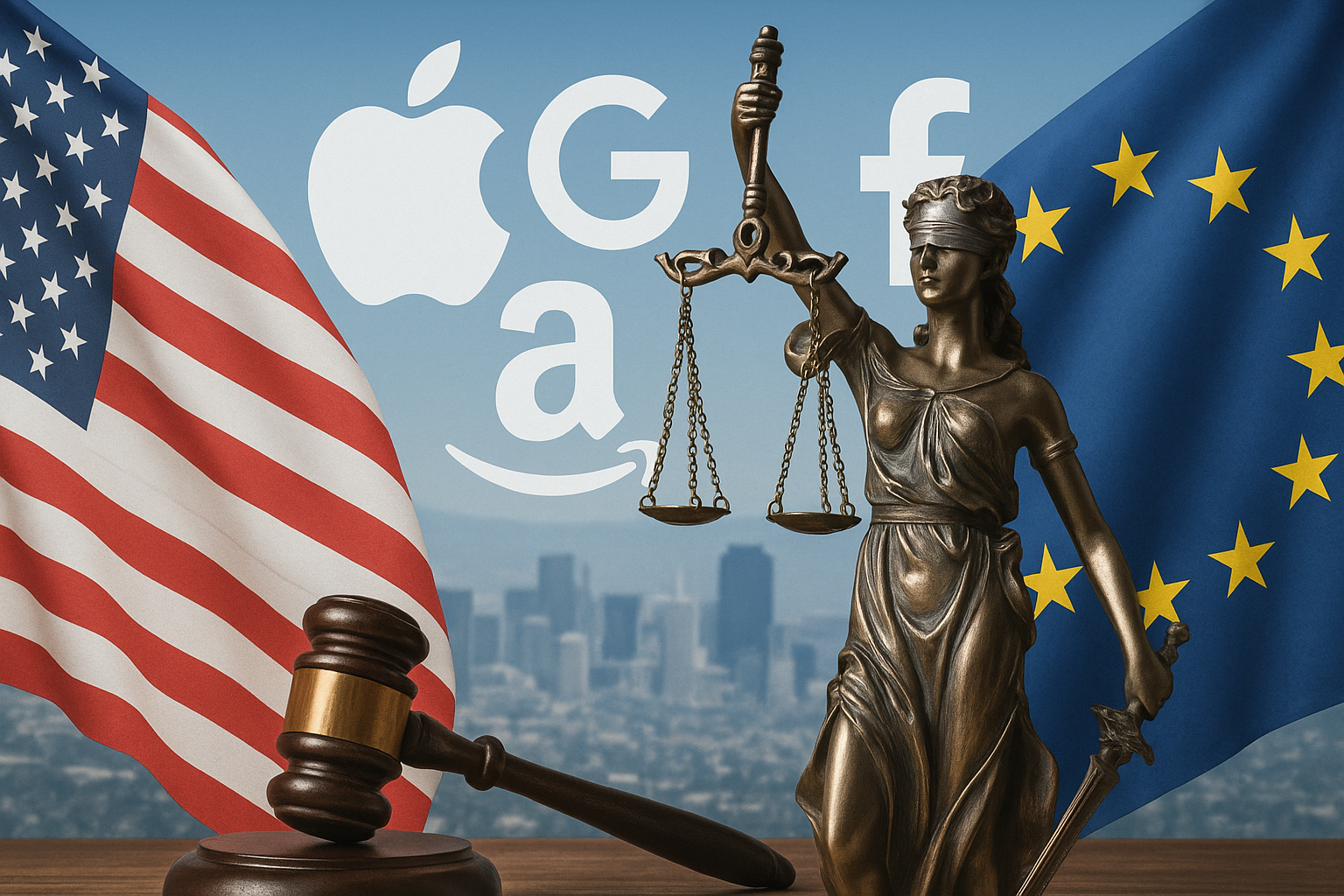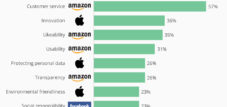
US judgments & EU penalties: the transatlantic double strike against tech giants! Furniture point for Silicon Valley? - Image: Xpert.digital
Google & Apple in the crosshairs: USA & EU forcing the largest tech regulation wave
Central developments in the antitrust processes
The regulatory landscape for large technology companies has worsened dramatically, with the headlines about “US v. Google” and EU measures against Apple and Meta as a sign of fundamental change in the antitrust procedure.
USA: Google's double strike: search monopoly and advertising network
Google is at the center of historical cartel procedures that the company condemned as an illegal monopoly in two critical markets. In August 2024, the US judge Amit Mehta found that Google is “a monopolist and acted as such to maintain his monopoly” and thus violated Section 2 of the Sherman Antitrust Act. The judgment was based on Google's exclusive contracts with Apple and other companies that established Google as a standard search engine - the payments to Apple alone amounted to $ 20 billion annually.
A second devastating verdict followed in April 2025, when judge Leonie Brinkema found that Google had “deliberately committed a number of contrary actions” in order to obtain and maintain its monopoly in the markets for publisher ads and advertising exchanges. This decision concerns Google's 31 billion dollar advertising business and could result in structural changes.
Suitable for:
- Google and Meta in the crossfire of the US competition keeper: Antitrust procedure despite the trump proximity
Most important US cartel procedure against tech giants (2024-2025)
The most important antitrust procedures against tech giants in 2024 and 2025 show a significant tightening of the regulatory measures. Google was found guilty of operating illegal monopolies in two significant US procedures. In August 2024, judge Amit Mehta on the US District Court decided in the case of the search monopoly in favor of the charges. The remedial procedure is still ongoing, with a potential splitting of Chrome being discussed. A second procedure against Google's advertising network was also decided in April 2025 by judge Leonie Brinkema with a guilty verdict for illegal monopolies. The corresponding remedial procedure is planned for September 2025.
At the same time, the European Commission imposed considerable fines against two other tech giants in April 2025 due to violations of the digital markets Act. Apple was fined 500 million euros, while Meta received a penalty of 200 million euros. These developments illustrate the increasing regulatory pressure on large technology companies in both the United States and in the European Union.
Structural remedial measures: the fight for Chrome
The remedial phase in Google's search monopoly process could lead to the most drastic measures against a technology company for decades. The Ministry of Justice calls for the split off of the Chrome browser, which has an active user of over 4 billion a month. The government argues that "a sale of Chrome Google's search engine and browser will separate and help to revitalize the competition on the online search market".
In addition to Chrome, the government calls for:
- Disconnecting the billion -dollar payments to Apple and other device manufacturers
- Division of search data and advertising data with competitors
- Increased transparency for advertisers
- Possible splitting of Android if the competition does not improve within five years
EU enforcement of the Digital Market ACT: initial fines imposed
The European Commission demonstrated its regulatory enforcement power by imposing the first fines according to the Digital Markets Act (DMA) in April 2025. Apple was punished with 500 million euros because the company did not allow app developers to inform users about alternative offers outside the App Store. The Commission found that Apple "could not prove that these restrictions are objectively necessary and proportionate".
Meta received a fine of 200 million euros for his “Pay Or Consent” model, which provided EU users before the election, either approved a personalized advertising or to pay for an ad-free version. The Commission argued that this binary system did not offer users the necessary choice for a less personalized but equivalent service.
EU Digital Markets Act - Enforcement measures
With the Digital Markets Act (DMA), the European Union has created an effective instrument to limit the power of the so -called “gatekeeper”. Several procedures have already been successfully completed, with Apple being occupied with a fine of 500 million euros to restrict the forwarding to alternative offers in his App Store. Meta received a penalty of 200 million euros for his binary “pay or agree” model.
Further studies are currently underway: Google is under observation because of the preference of its own services, while Apple is immediately involved in two procedures-once with regard to insufficient browser choice of choice and on the other hand due to high fees for alternative app stores through the so-called Core Technology Fee. The results of these ongoing procedures are still pending.
The European Commission has classified six companies as a gatekeeper: Alphabet, Amazon, Apple, Meta, Bytedance and Microsoft. These companies are subject to strict obligations that aim to open markets for competitors and to offer users more options. The DMA has thus established itself as an effective regulatory tool for promoting competition in the digital area.
Suitable for:
- Digital Markets Act (DMA) | EU imposed millions of penalties against Apple and Meta due to violations of digital law
Global trend towards tightened regulation
Developments in the USA and the EU are part of a global trend towards increased regulation of tech giants. Cartel authorities worldwide show a new determination to take structural measures instead of relying on fines.
Global trends in tech regulation
- Increased antitrust procedures against tech giants worldwide-regulatory authorities in various jurisdictions coordinate their efforts
- Focus on structural remedial measures - splitting up companies is considered fines than fines
- Preventive regulation by laws such as the DMA-Ex-Antant regulation to prevent competitive practices
- Coordination between international regulatory authorities - increased cooperation in cross -border cases
- Higher fines and sharper enforcement - regulatory authorities focus on a deterrent effect
- Special attention to AI markets and data concentration-new technologies in the focus of the antitrust authorities
Reactions of industry and geopolitical tensions
The tightened regulation has led to considerable tensions between the USA and the EU. META boss Mark Zuckerberg publicly demanded that the US government should defend tech companies against further EU money punishment. The Trump administration has ordered a review of the EU-Tech regulation and threatened with retrieving tariffs.
Apple and Google have signaled their willingness to contest the judgments, but the prospects for successful vocations are uncertain in view of the extensive evidence and clear judicial findings.
Regulatory tsunami meets tech industry: fundamental structural changes expected
The current developments mark a turning point in the antitrust procedure against tech giants. The combination of successful procedures in the USA and the determined enforcement of the DMA in the EU shows that the era of the largely unregulated expansion of Big Tech comes to an end.
The remedial procedure in the coming months will be crucial for whether these regulatory challenges lead to fundamental changes in the structure of the tech industry. With Google's remedial negotiations in the Search Monopoly Fall until August 2025 and other EU DMA investigations, the tech industry is facing its greatest regulatory upheaval for decades.
Suitable for:
Your global marketing and business development partner
☑️ Our business language is English or German
☑️ NEW: Correspondence in your national language!
I would be happy to serve you and my team as a personal advisor.
You can contact me by filling out the contact form or simply call me on +49 89 89 674 804 (Munich) . My email address is: wolfenstein ∂ xpert.digital
I'm looking forward to our joint project.

